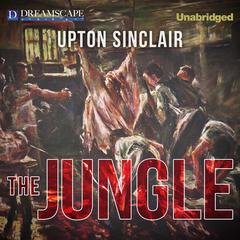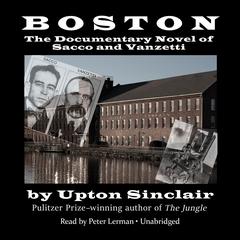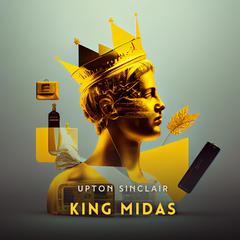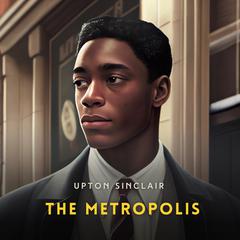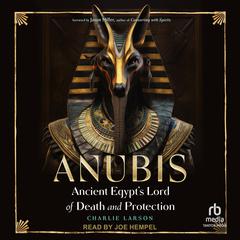 Play Audiobook Sample
Play Audiobook Sample
The Jungle Audiobook
 Play Audiobook Sample
Play Audiobook Sample
Quick Stats About this Audiobook
Total Audiobook Chapters:
Longest Chapter Length:
Shortest Chapter Length:
Average Chapter Length:
Audiobooks by this Author:
Publisher Description
Here is the dramatic expos├® of the Chicago meatpacking industry at the turn of the century that prompted the investigation by Theodore Roosevelt which culminated in the pure-food legislation of 1906.
The Jungle is the story of Jurgis Rudkus, a Slavic immigrant who marries frail Ona Lukoszaite and seeks security and happiness as a workman in the Chicago stockyards. Once there, he is abused by foremen; his meager savings are filched by real estate sharks; and at every turn he is plagued by the misfortunes arising from poverty, poor working conditions, and disease. Finally, in accordance with Sinclair’s own creed, Rudkus turns to socialism as a way out.
Download and start listening now!
"Part family narrative, and part political discourse, Upton Sinclair's 'The Jungle' has a clearly defined appeal to both these camps of interested readers, but if either camp is looking for a book devoted to their respective interest, they may be disappointed. This is not meant as a criticism, but rather praise for what Sinclair crafted in the telling of this story, which follows the horrors endured by an immigrant family coming to America for the 'working man's dream' only to be ground under the wheels of corporate greed, crooked politicians, and a careless capitalist society. Some readers may wish to distinguish the two different parts of the book, but considering Sinclair's goals in the crafting of this book, I think the different parts of this book should be understood as intertwined. There have been other books about the plight of immigrant workers, and yet other books about socialism and political commentary, but Sinclair's is different in that it is a very human tale. Without the emotional investment in the characters and their struggles as complete people, the latter stages of the book would not resonate as they do, and, in hindsight, it is rather clear that the early parts of the book are to serve the latter, more political parts. And while in the United States we like to believe things have changed with our industrial regulations, whether or not one is to subscribe to this belief all one has to do to find the world Sinclair describes is look out to developing nations and the horrors many of their laborers endure in this current day. In that regard 'The Jungle' is still relevant, and remains a needed portrait of the experiences of people considered by larger economic forces to be 'expendable' labor. I for one did prefer the earlier, less political, stages of the book, as the message is relayed through the narrative events, and, in my opinion, most vividly when the main character, Jurgis, decides to work for the forces of corruption that had led to so much ruin in his life. When he sees the hollow, disgusting- although profitable- charade of that life, the book then moves into its final arc, which is overt political lecturing. Regardless of one's particular interest, this remains an important book, and an excellent exercise of prose."
— Roland (5 out of 5 stars)
Quotes
-
“[Sinclair] saw through the lies of his era and exposed a world long hidden from view. He showed compassion for the weak and the poor, the powerless and the despised. He created images and characters that are poignant and memorable.”
— Eric Schlosser, New York Times bestselling author -
“The Jungle has given to the world a close, a striking, and, we may say, in many ways a brilliant study of the great industries of Chicago.”
— New York Times -
“More telling and more moving than even the works of Dickens and Zola.”
— Atlantic Monthly -
“The most famous, influential, and enduring of all muckraking novels.”
— Merriam Webster’s Encyclopedia of Literature
The Jungle Listener Reviews
-
" Depressing from start to finish. :( hard to read about all that suffering. "
— Rmry68, 2/16/2014 -
" Every high school in America should have this as required reading. "
— Dale, 2/14/2014 -
" Worst book I have EVER read in my life, Junie B. Jones is more entertaining than this. "
— Gabi, 2/11/2014 -
" I always wanted to read this book since everyone talked about the changes it caused in the meatpacking industry. I still don't get why no one really talks about the suffering the immigrant families had to go through. It's along the lines of The Grapes of Wrath. So much work, but so little is shown for it. I could deal with the descriptions of the meat and all, but by the time I was on the last couple of chapters it was a chore to finish since it was devoted solely to Socialism. "
— Xandra, 1/16/2014 -
" Just finished listening The Jungle on CD. Upton Sinclair's The Jungle is a vivid portrait of life and death in a turn-of-the-century American meat-packing factory in Chicago's stockyards. A grim indictment that led to government regulations of the food industry, The Jungle is Sinclair's extraordinary contribution to literature and social reform. "
— Marcia, 1/12/2014 -
" Read this for my Novella book club and while it's not the most uplifting book on the planet, it's a damn good book if you think of it as part of Chicago's history. "
— Jenn, 1/1/2014 -
" Another one of my favorite books of all time. This classic that explains the life and times of the hard working poorer class individuals is hard to get through. Add to that the disgusting state of affairs of the Chicago stockyards, and you will be riling in disgust that conditions were once like this in the United States of America. "
— Ryan, 12/16/2013 -
" I felt like I had read "Atlas Shrugged", but through a dirty kaleidiscope. I had wanted to finish this book since high school, and while I am glad I did, I don't know if it means anything more than words on paper. Review subject to change. "
— TJ, 12/16/2013 -
" Awesome book about what will happen if we deregulate corporations and business,oh, wait, its a historical novel.. "
— Adam, 12/12/2013 -
" Really interesting look at the lives of immigrants in Chicago and the disgusting methods and state of the meatpacking industry. Could make you go vegetarian! "
— Aurora, 12/4/2013 -
" Have you ever started reading a book that has existed your entire life, gotten fifty pages in and thought, "How have I possibly lived as long as I have WITHOUT reading this book?" Well, this is that. "
— Moira, 12/4/2013 -
" Depressing and gross, but very interesting nonetheless. My Irish ancestors started off in Chicago, so I am getting a glimpse of what it could have been like for them at this period. "
— Marianna, 7/27/2013 -
" Like 1984, in that this book challenges the status quo forming our everyday life. It's history alone raises a lot of questions that aren't comfortable. "
— Michael, 7/12/2013 -
" Definitely not a light read, nor an uplifting read. Although a VERY good book, it is very dark, heavy and depressing. It is a story of perseverance but not victory, of continuing to stumble and never getting ahead. "
— Ashley, 6/21/2013 -
" Great book about the Industrial revolution in the United States. "
— Gina, 5/23/2013 -
" I enjoyed it. It was a little dark, I kept waiting for relief. I got it to a certain degree but it seemed that ultimately it was a propaganda in favor of socialism. "
— Darla, 11/7/2012 -
" The first half of this book is the most devastating and gruesome story I've ever read. The second half provides a welcome break from the can-it-get-any-worse heartbreak, but it's not nearly as gripping. "
— Lynn, 8/30/2012 -
" I liked it, but the book was VERY intense. It really shows what really happened during the Gilded Age. "
— Whitney, 10/2/2011 -
" if u haven't u really should "
— Preston, 8/24/2011 -
" Most depressing book I've ever read, including Steinback. "
— Lulu, 7/1/2011 -
" Sinclair describes Chicago in March so well I felt cold and shiverred when I read the pages, looking for a warm place to hide. "
— Pascal, 5/20/2011 -
" Plot summary: Meat-packing and capitalism suck, and everything goes wrong. I only got halfway through before giving up. "
— Zach, 5/10/2011 -
" Read it back in junior year of high school. Remember it was pretty eye-opening to the plight of immigrant workers in industrial cities. Opens with a scene of a Polish wedding, I believe. <br/> <br/>Enjoyed it but don't remember too many specifics of it. <br/> <br/> "
— Brian, 5/4/2011 -
" Without question, the most depressing book I've ever read. I enjoyed most of it, but the last 20-30 pages strayed so far from the narrative that it sort of ruined it for me. "
— Chris, 4/28/2011 -
" This was really informational and a great read. However, it takes an abundance of concentration to read due to Sinclair's deep descriptions. Other than that, I definitly recommend this book! "
— Kayla, 4/27/2011 -
" I read this many years ago and decided to read it again. I understand it alot more now than I did back then. Very informative and I really learned alot the second time around. "
— Rosie, 4/23/2011 -
" The grossness of this book made it hard for me to read. However I did finish it. It was memorable but for all of the wrong reasons. "
— Rayna, 4/22/2011 -
" Loved it! Great story and kind of eye opening about the food industry and labor in the early 1900's. Didn't care for the ending so much but overall really enjoyed the book. "
— Brittany, 4/19/2011
About Upton Sinclair
Upton Sinclair (1878–1968) was a journalist, a prominent social and political activist, and the author of over one hundred books, including the novel Dragon’s Teeth, which won the Pulitzer Prize in 1943. He is perhaps best known for The Jungle, the dramatic exposé of the Chicago meat-packing industry that prompted the investigation by Theodore Roosevelt that culminated in the pure-food legislation of 1906.
About Grover Gardner
Grover Gardner (a.k.a. Tom Parker) is an award-winning narrator with over a thousand titles to his credit. Named one of the “Best Voices of the Century” and a Golden Voice by AudioFile magazine, he has won three prestigious Audie Awards, was chosen Narrator of the Year for 2005 by Publishers Weekly, and has earned more than thirty Earphones Awards.







